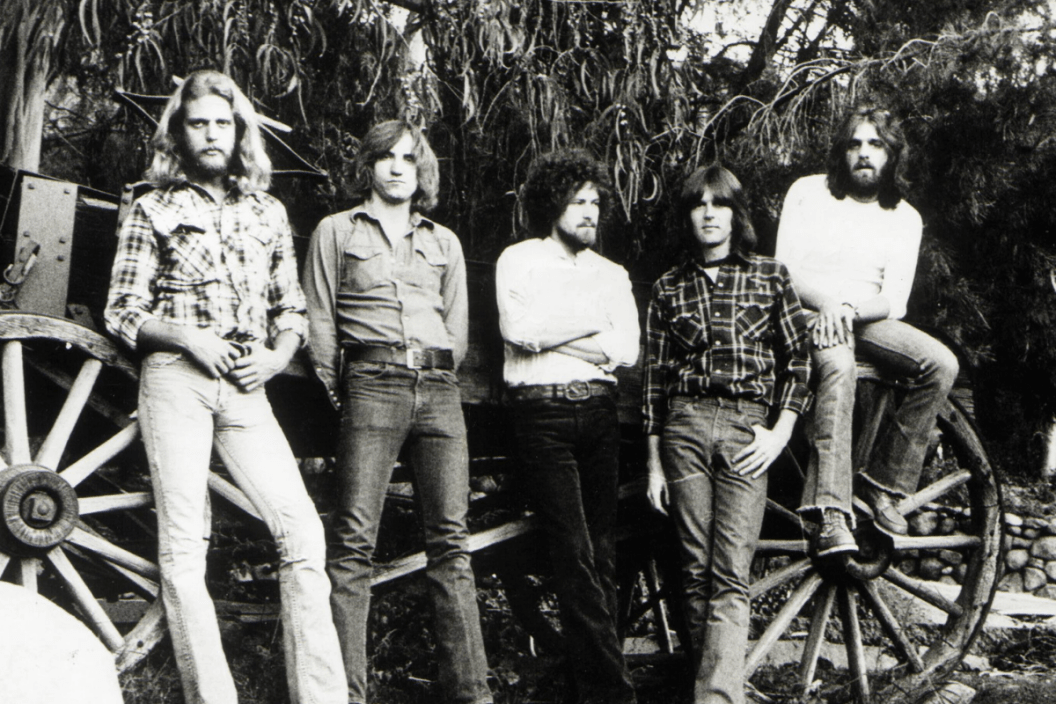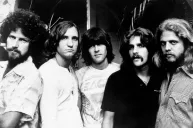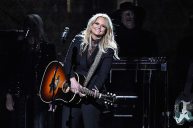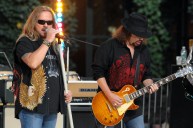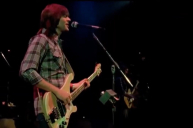"Hotel California," the title track of The Eagles' hit 1976 album, sounds creepy enough without offering any credence to decades-old rumors about the song's sinister secret.
One particularly eerie fan interpretation of the purposefully vague song correctly notes that Anton LaVey started his Church of Satan in a San Francisco, Cal. hotel in 1969. LaVey's story has been shoehorned into the lyrics, and there's supposedly more praise for his teachings if you play the song backwards. Some even insist that LaVey can be seen in the album's gatefold image, though it looks more like a woman's watching over The Eagles and crew's photoshoot.
Before examining the lyrical intentions of songwriters Don Felder, Don Henley and Gren Frey, let's briefly revisit the bizarre history of reverse lyrics in rock songs.
A Brief History of Backmasking
Like many things in rock music, backmasking began with The Beatles. John Lennon and producer George Martin snuck benign, hidden messages into at least three songs off 1966's Revolver: "Tomorrow Never Knows," "I'm Only Sleeping" and "Rain." This creative wrinkle would later fuel rumors that some later Beatles songs (namely "Revolution 9" and its "Turn me on, dead man" surprise) contained backward messages about Paul McCartney's death and a subsequent cover-up.
As rock got heavier in the '70s, "Paul is Dead" hysteria gave way to rumors of subliminal messages from the pits of Hell. Stories of Led Zeppelin's 1971 song "Stairway to Heaven" hiding something Satanic ("Here's to my sweet Satan...") became prevalent enough that Swan Song Records issued the statement: "Our turntables only play in one direction—forwards."
Accusations of Satanic messages were also lobbed at the likes of Queen (when played backwards, "Another One Bites the Dust" becomes gibberish that halfway resembles "It's fun to smoke marijuana") and such classic rock radio mainstays as Cheap Trick ("Gonna Raise Hell"), Electric Light Orchestra ("Eldorado," "Fire on High"), Styx ("Snowblind"), Pink Floyd ("Empty Spaces") and in a case that got litigious, Judas Priest ("Better By You, Better Than Me").
In the '80s, the "Satanic panic" that targeted Dungeons & Dragons plus the rise of the PMRC and certain heavy metal bands' not-so-secret obsession with Satanism (as if Slayer's "Hell Awaits" needed backwards masking to get its point across) kept the controversy alive. At this point in the backmasking timeline, what had been interpreted as a few acts with bad intentions or a handful of sonic coincidences was treated like a music industry-wide plot to lead all teenagers astray.
If there's a cynical tone to all of that, it's because compelling fans to ruin records by playing them backwards hardly makes sense as a game plan to convert the masses to Satanism. And if backmasking's a valid way to subliminally sway listeners, then why not sneak in "buy a dozen more copies" instead of garbled lines that a few well-intentioned parent's groups or ministers can twist into referencing Aleister Crowley or other historic boogeymen?
Plus, you might've noticed that when it comes to classic cases of supposed backmasking, you hear nothing but noise until you read or are told the supposed hidden message. As The Skeptic's Dictionary puts it: "you probably won't hear [hidden] messages until somebody first points them out to you. Perception is influenced by expectation and expectation is affected by what others prime you for."
But What About The Eagles?
Rumors about hidden messages in "Hotel California" still hinder some potential listeners' embrace of The Eagles (but not as much as that one quote from The Big Lebowski, of course). Realistically, there's nothing to fear, and there's no reason to doubt the songwriters' explanations of the lyrics' true meaning.
Per Henley, the song's an allegory about the cost of living an excessive rock star lifestyle in Hollywood.
"Lyrically, the song deals with traditional or classical themes of conflict: darkness and light, good and evil, youth and age, the spiritual versus the secular," he told Rolling Stone (as quoted by Encyclopedia of Great Popular Song Recordings, Volume 1). "I guess you could say it's a song about loss of innocence."
Felder, who plays that seamless solo at the end of the song with fellow guitarist Joe Walsh, also describes the allure of Hollywood when talking about the song's meaning.
"Nobody in the band was from California," Felder told Music Radar. "Bernie was originally from San Diego, but he wasn't in the band at that point. So everybody had driven into Los Angeles on what used to be Route 66. And as you drive in through the desert at night, you can see the glow of Los Angeles from a hundred miles away. The closer and closer you get, you start seeing all of these images, and these things pounded into our heads: the stars on Hollywood Boulevard, movie stars, palm trees, beaches and girls in bikinis."
None of that sounds like a ringing endorsement of sin, does it? Plus, this lost innocence described by Henley surely had more to do with Vietnam and Watergate than LaVey. Besides, would Vince Gill hang out with a group that sabotaged our subconscious minds with such half-cooked lines as "Yes, Satan organized his own religion" (the supposed backwards message hiding behind the lyric "Wake you up in the middle of the night...")?
'Hotel California' Lyrics:
Cool wind in my hair
Warm smell of colitas
Rising up through the air
Up ahead in the distance
I saw shimmering light
My head grew heavy and my sight grew dim
I had to stop for the night
I heard the mission bell
And I was thinking to myself
This could be Heaven or this could be Hell
Then she lit up a candle
And she showed me the way
There were voices down the corridor
I thought I heard them say
Such a lovely place (such a lovely place)
Such a lovely face
Plenty of room at the Hotel California
Any time of year (any time of year)
You can find it here
She got the Mercedes Benz
She got a lot of pretty, pretty boys
She calls friends
How they dance in the courtyard
Sweet summer sweat
Some dance to remember
Some dance to forget
Please bring me my wine
He said, 'We haven't had that spirit here"
"Since 1969"
And still those voices are calling from far away
Wake you up in the middle of the night
Just to hear them say
Such a lovely place (such a lovely place)
Such a lovely face
They livin' it up at the Hotel California
What a nice surprise (what a nice surprise)
Bring your alibis
The pink champagne on ice
And she said, 'We are all just prisoners here"
"Of our own device"
And in the master's chambers
They gathered for the feast
They stab it with their steely knives
But they just can't kill the beast
Running for the door
I had to find the passage back
To the place I was before
"Relax, " said the night man
"We are programmed to receive"
"You can check-out any time you like"
"But you can never leave!"
READ MORE: 'Desperado':The Story Behind The Eagles' Country-Western Heartbreaker
Editors Note: This article was originally published on October 29, 2020. It was updated on October 25, 2021.
